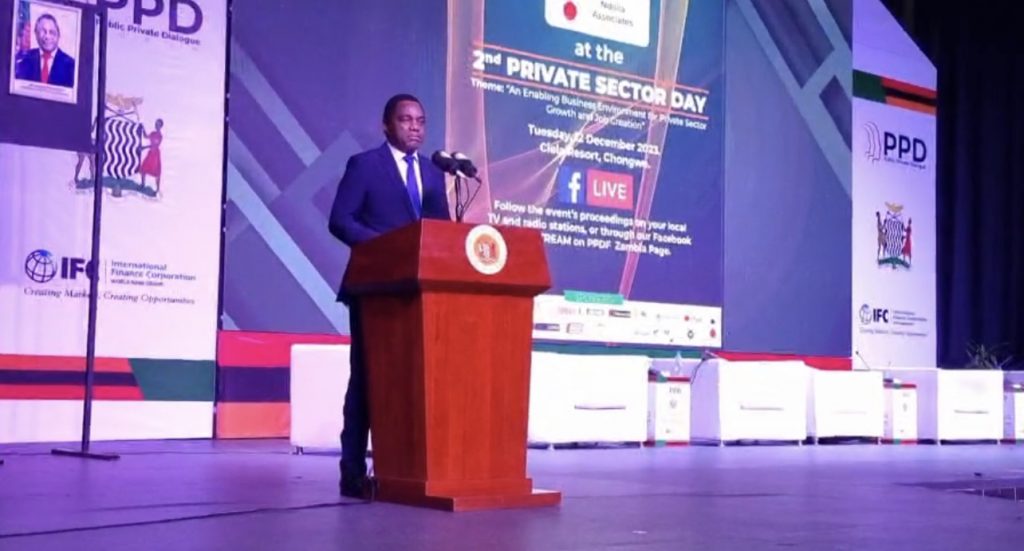Africa’s second largest copper producer is making relentless strides to effect stronger growth through giving its private sector a more conducive environment to thrive. One key hurdle that entrepreneurs across the continent have bemoaned is high cost of capital which has been as result of fiscal posture shaping yields curves that are used as benchmarks for credit pricing. Head of state and chief investment officer Hakainde Hichilema in a keynote address at the second private sector day of the Private Public Dialogue called for fairly priced credit from the banking sector.
“Affordable capital we have already touched on it. The banks, the lady musketeers, I have asked for you to do your bit by lowering the cost of capital. Lets not work on margins only but work on volumes. And then to our co-operating partners, the message has gone out, if I’m to speak at a meeting in the European Union (EU) or in the United States (U.S) they know that President Hichilema will talk about fairly priced capital. Generally there’s agreement that Africa is being discriminated by credit rating agencies. I was in Berlin 2 weeks ago on a panel and I said we must begin to deal with the way we accentuate Zambia as an African economy. If we clip Africa from fairly priced capital how do we expect it and nations like Zambia to grow. We need to address those things. You have a messenger here who is talking about these issues and other African Presidents have joined, about the number of my fingers (5) and the world is listening. Part of the global financial reforms is not only to get Africa on the table where decisions are made but also to lower the cost of capital for its economies but we ourselves should also behave properly because sometimes we contribute to the high cost of capital with the way we do business and the way governments do things damages our own profiling out there,” President Hakainde Hichilema said. We know also that we are being profiled unfairly because we are Africans, he said.
The Emmanuel Macron global finance summit earlier in June this year hosted African leaders alongside global heads of state in Paris at a summit that deliberated on how the continents leaders can have a seat at global decision making and above all how financing costs can be lowered. It is on the sidelines of the climate finance summit that Macron as co-chair of the official creditors committee announced the landmark $6.3 billion debt treatment for Zambia.
Earlier in the session International Finance Corporation shared insights on the role the IFC has played in stimulating private sector growth in the Zambian economy. In September, the IFC issued a K193.7 million local currency Zambezi bond to help with capital markets deepening while in July of 2022 had extended $35 million kwacha equivalent financing to Zambia’s top agribusiness entity Zambeef whose proceeds were used to double its Mpongwe asset. Being the largest development finance institution globally the IF has a mammoth task to stimulate private sector growth in emerging markets.
“Local currency financing is important for countries like Zambia, we doing local currency financing across emerging markets we see it as a great way of helping nations feeling squeezed by foreign currency constraints. You mentioned a bond, watch the space, another one maybe coming your way. And for the corporate here in Zambia, Zambeef we did a $35 million local currency finance which we are proud of helped them expand their tax revenue contributions which the government appreciated but also created 1400 jobs supported SMES, small holder farmers and supply chains. We have done another local currency one to financial institutions that will support acceptance to finance to local entrepreneurs especially those in rural areas and for women finance. Local currency finance will remain strong and we see other opportunity areas aligned to the public private stakeholders we have been engaging with,” IFC Director for Eastern Africa Mary Porter Peschka said during a panel discussion in response to the opportunities the development institution see despite the foreign currency liquidity constraints and elevated interest rate environment the copper producer faces.
One of the key drivers of an elevated term structure of interest rates is fiscal posture that is expected to improve with the completion of debt restructure. Dollar bonds remain the stickiest debt which is the only graded portion and will only result in a rating upgrade when successfully reorganized.
Foreign currency rating improvement from current default will open credit lines for the sovereign which will in turn decongest the domestic money market to allow liquidity to now be housed in the private sector resulting in lower cost of finance.
The Kwacha Arbitrageur

